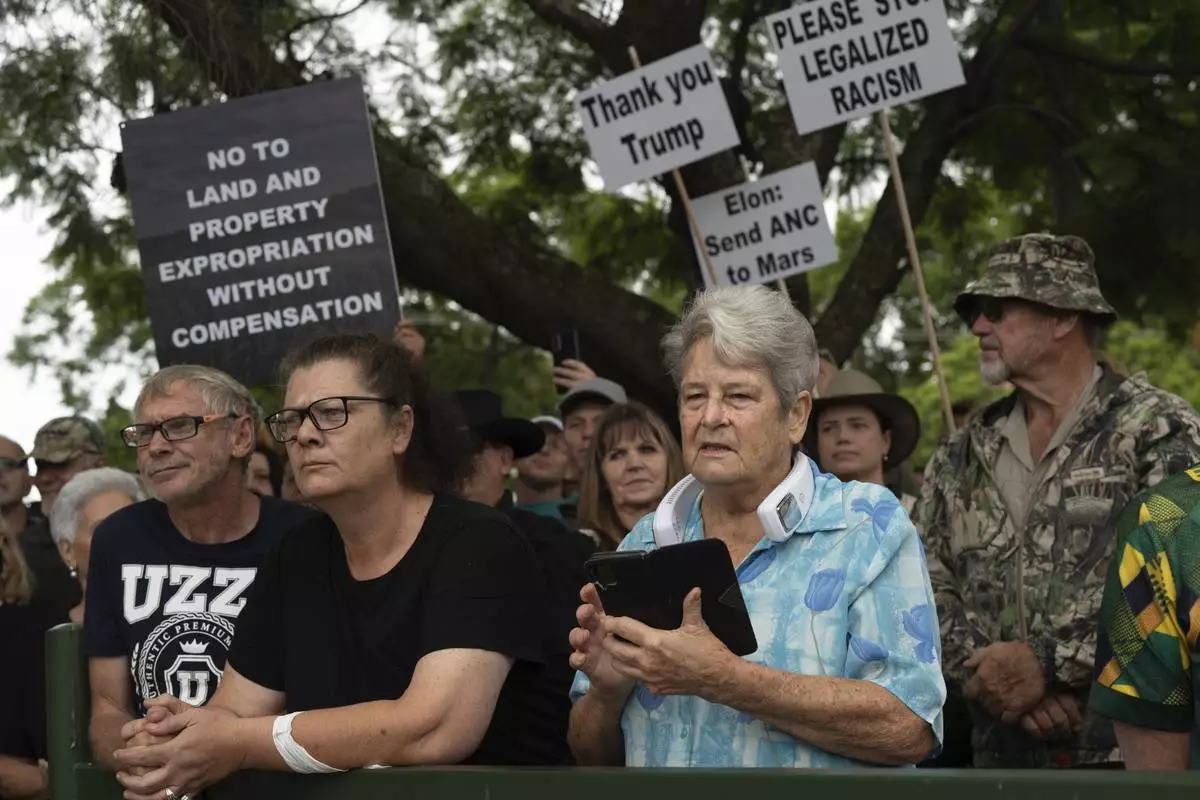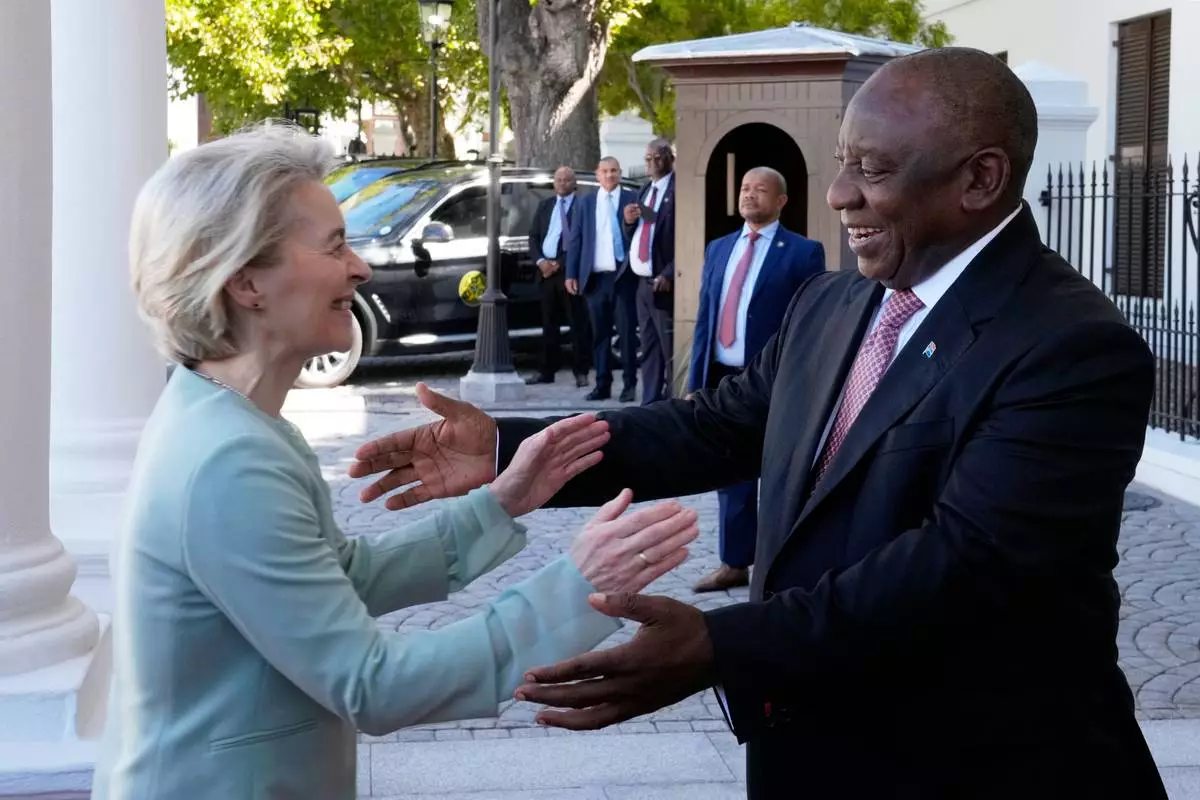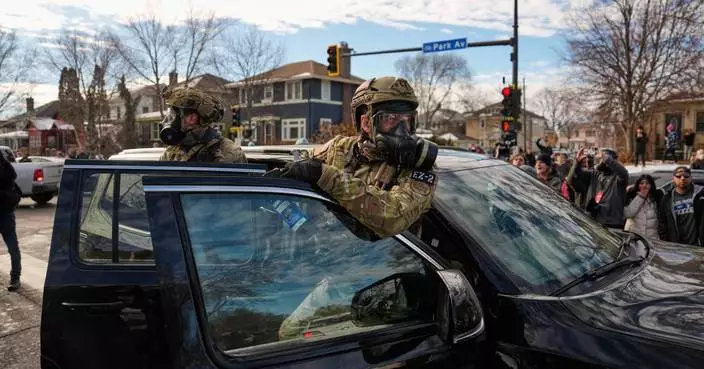CAPE TOWN, South Africa (AP) — South African President Cyril Ramaphosa said Monday the claim that white people are being persecuted in his country is a “completely false narrative.” It was his latest attempt to push back against allegations made by U.S. President Donald Trump, Elon Musk and some white minority groups in South Africa.
South African-born Musk, who has regularly accused South Africa's Black-led government of being anti-white, repeated a claim this weekend in a social media post that some of the country's political figures are “actively promoting white genocide."
Ramaphosa said in his weekly message to the nation that South Africans “should not allow events beyond our shores to divide us or turn us against each other.”
“In particular, we should challenge the completely false narrative that our country is a place in which people of a certain race or culture are being targeted for persecution.”
Ramaphosa did not mention names, but his denial was a reference to the allegations by Trump and others that South Africa is deliberately mistreating a white minority group known as Afrikaners by encouraging violent attacks on their farms and introducing a law designed to seize their land.
The allegations were central to an executive order issued by Trump last month cutting funding to South Africa to punish the government, while offering Afrikaners refugee status in the U.S.
Afrikaners are descendants of mainly Dutch and French colonial settlers who first came to South Africa more than 300 years ago. They were at the heart of the apartheid government that systematically oppressed non-whites, although South Africa has been largely successful at reconciling its many racial groups after apartheid ended in 1994.
In his post on X, influential Trump adviser Musk cited a political rally last Friday in South Africa where Black leaders of a far-left opposition party sang a song that has the lyrics “Kill the Boer, the farmer.” Boer is a word that refers to an Afrikaner.
“Very few people know that there is a major political party in South Africa that is actively promoting white genocide,” Musk wrote. He linked to a video of the rally.
Secretary of State Marco Rubio wrote on X late Monday that the song “is a chant that incites violence. South Africa’s leaders and politicians must take action to protect Afrikaner and other disfavored minorities. The United States is proud to offer those individuals who qualify for admission to our nation amid this continued horrible threat of violence.”
The party in question, the Economic Freedom Fighters, is the fourth biggest in Parliament and a political opponent of Ramaphosa's African National Congress. It won 9.5% of the vote in last year's national election. It has come under scrutiny for stirring racial tensions before and for singing the song, which was used during apartheid as a call to fight against government oppression.
The song's modern-day use has been criticized by some in South Africa, including by other political parties, and a group representing Afrikaners challenged its use in court. It was ruled hate speech and effectively banned by a court more than a decade ago.
But it was the subject of several other legal cases before a 2022 ruling found that it was not hate speech and protected under freedom of speech because there was no proof it incited violence. The EFF says it is a historic chant that shouldn’t be taken literally and has sometimes changed the lyrics to "kiss the Boer."
Since Trump's executive order, the South African government has sought to dispel what it says is misinformation over white farmers, who are sometimes victims of violent attacks in their homes. The government has condemned the attacks, but experts say there is no evidence of any widespread targeting of whites and they are in fact part of South Africa's extremely high violent crime rates, which affect all races.
The group representing Afrikaners says the police have sometimes undercounted farm homicides in official statistics. It recently said it had figures showing there were eight farm homicides in the three-month period between October and December last year when police only recorded one.
There were a total of 6,953 homicides across South Africa during that same time period, according to the police statistics.
Associated Press writer Mogomotsi Magome in Johannesburg contributed to this report.
AP Africa news: https://apnews.com/hub/africa

FILE - White South Africans demonstrate in support of U.S. President Donald Trump in front of the U.S. embassy in Pretoria, South Africa, Feb. 15, 2025. (AP Photo/Jerome Delay, File)

South Africa's President Cyril Ramaphosa, right, welcomes Ursula von der Leyen, the European Commission President, ahead of the eighth EU-South Africa summit in Cape Town, South Africa, Thursday, March 13, 2025. (AP Photo/Nardus Engelbrecht)

Elon Musk attends the finals at the NCAA wrestling championship, Saturday, March 22, 2025, in Philadelphia. (AP Photo/Matt Rourke)














